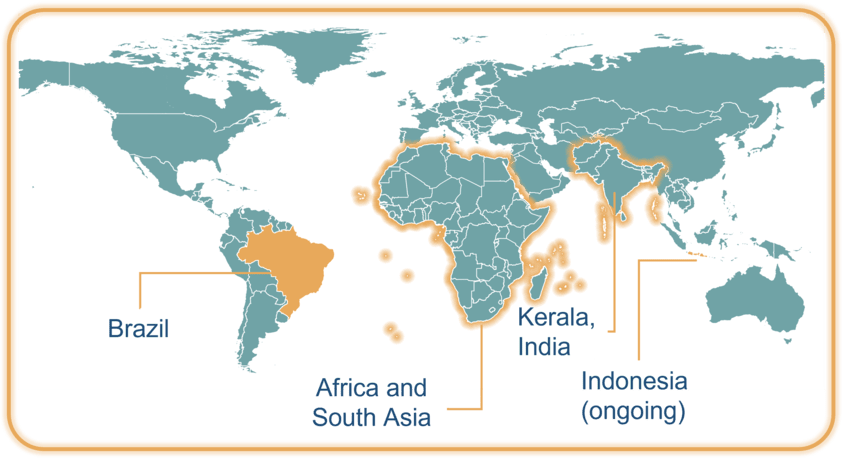Case Studies
The SPOT model is currently being applied at global level and will be presented in a scientific publication shortly. Prior to this, it has already been applied in four global countries and regions as shown on the map below.

With each implementation of SPOT, we have improved our understanding of cultural, socio-economic and political factors which result in different behaviours, practices and attitudes towards waste management in each country or region. Our work has also highlighted the state of waste management information which varies substantially in availability and reliability throughout the world.
Brazil
For this implementation of SPOT, we used demographic and behavioural data from the Brazilian Census, the SNIS Diagnosis of Solid Waste Management and other sources to map plastic waste flowing through societal and environmental systems in Brazilian municipalities. Brazil's thriving informal recycling sector was also mapped to identify several areas where they play a substantial role in mitigating plastic pollution through their efforts to recover plastic waste at risk of emission.
Kerala
Funded by The World Bank Group, we used the SPOT model to provide the evidence base to implement a USD 105 million investment in solid waste management infrastructure in the State of Kerala, in India. Together with our partners, Resource Futures, we mapped plastic pollution pathways and emission points across the state and carried out economic modelling to assess the feasibility of interventions.
Africa and South Asia
In 2019, UN-Habitat, Wasteaware and the University of Leeds supported by United Nation Environment Programme, UNEP jointly conducted a GIS modeling to identify 50 land-based marine litter hotspots in Africa and South Asia as well as municipal solid waste assessments to identify infrastructure investment gaps. This was based on SDG indicator 11.6.1, “proportion of municipal solid waste collected and managed in controlled facilities out of total municipal solid waste generated, by the city”. Our assessment tool was developed by UN-Habitat and eventually culminated in the development of the Waste Wise Cities Tool (WaCT).
Indonesia
As part of the PISCES Project, the University of Leeds is undertaking a pan-archipelagic study of waste management across Indonesia. The SPOT model is undergoing validation as part of a collaboration with the University of Plymouth and Institut Teknologi Bandung (ITB) in Indonesia. Plastic emission predictions are undergoing ground-truthing to assess the cap;lability of SPOT to identify plastic pollution hot and cold spots.
ASEAN multi-city regions
As part of a project for UNESCAP, we integrated the terrestrial transport component of the SPOT model with the Plastic Pollution Calculator to assess the spatial distribution of plastic waste emissions at fine resolution. Four multi-city regions were assessed across the ASEAN region: Da Nang City - Viet Nam; Surabaya - Indonesia; Kuala Lumpur - Malaysia; and Nakhon Si Thammarat - Thailand.
